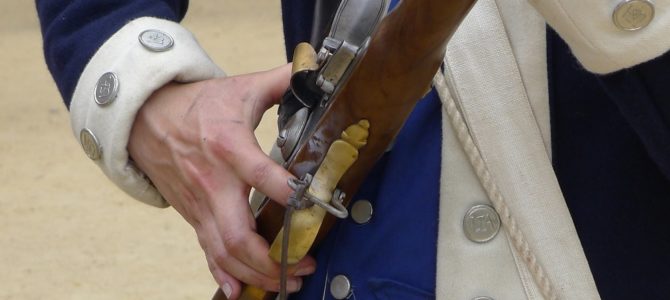
As the author of nine historical books, my heart has truly been broken at the nihilistic, all-or-nothing approach to history demonstrated by anarchists tearing down and vandalizing statues, especially of George Washington and Abraham Lincoln. Often spray-painted on these statues is 1619, a reference to The 1619 Project, published by The New York Times.
“The fundamental [1619] claim that the Revolutionary War was fought to preserve slavery simply does not correspond with the facts, too conclusively for the point to be dismissed as mere hair-splitting. The issue is not differing interpretations of history, but an outright misinterpretation of it,” African-American scholar John McWhorter wrote on 1776Unites.com, which warns of 1619’s fallacies.
“For one, note the suspension of disbelief we are expected to maintain. Supposedly the Founding Fathers were trying to protect slavery, despite never actually making such a goal clear for the historical record, and at a time when there would have been no shame in doing so,” McWhorter observed.
My research of the record concurs. In fact, throwing off political slavery by England motivated many to fight for independence. In writing “Stories of Faith and Courage from the Revolutionary War,” I read original letters, writings, and sermons from the nation’s founding generation. One question I asked: how did Christians justify taking up arms against their God-ordained king? Ministers and congregations looked to two primary biblical examples to resolve this faith crisis. Both directly related to slavery.
“I have this morning heard Mr. Duffield upon the signs of the times. He runs a parallel between the case of Israel and that of America, and between the conduct of Pharaoh and that of [King] George,” John Adams wrote his wife, Abigail, in mid-May 1776, after attending church in Philadelphia. If God delivered the Israelites from slavery by Egypt, would He deliver America from enslavement by England? Adams hoped so.
“(Duffield) concluded that the course of events indicated strongly the design of Providence that we should be separated from Great Britain.” Duffield and Adams were not alone. “We have no choice left to us, but to submit to absolute slavery and despotism, or as freemen to stand in our own defence, and endeavor a noble resistance . . . every reasonable method of reconciliation has been tried in vain,” Baptist minister David Jones declared. “Our addresses to our king have been treated with neglect or contempt.”
Jones looked to Galatians 5:1, as did others, including Simeon Howard of Boston’s West Church: “Stand fast therefore in the liberty wherewith Christ hath made us free. And be not entangled again with the yoke of bondage.”
“It is the duty of all men to stand fast in such valuable liberty, as Providence has conferred upon them,” Howard proclaimed. “But in what way can a man be more justly chargeable with this neglect, than by suffering himself to be deprived of his life, liberty or property, when he might lawfully have preserved them?”
These Americans saw themselves as enslaved by Great Britain. This was not a new concept. Some of their ancestors had fled England to escape religious intolerance.
“They would hazard everything dear to them, their estates, their very lives, rather than suffer their necks to be put under that yoke of bondage, which was so sadly galling to their fathers, and occasioned their retreat into this distant land, that they might enjoy the freedom of men and Christians,” wrote Boston’s First Church’s Charles Chauncy.
The view that Americans were enslaved by England enabled many to see the hypocrisy and injustice of enslaving Africans, which was legal in the 13 original colonies.
“By the 1770s, black New Englanders, thousands of whom were Revolutionary War veterans, had begun sending petitions to northern state legislatures demanding an end to slavery. These, essentially, worked,” African-American scholar Wilfred Reilly wrote for 1776Unites.com. “By the 1790s, 10 states and territories, containing more than 50 percent of the free population of the new nation — Maine, New Hampshire, Vermont, Massachusetts, Rhode Island, Connecticut, New York, Pennsylvania, the North-West Territory, and the Indiana Territory — were free land by law. And, the anti-slavery upswell continued apace.”
History isn’t always what it seems. It is more nuanced, incremental, and complicated than today’s all-or-nothing purity approach by the statue-toppling mob. This headline-only approach to history misses questions like this: How did George Washington transform from being born into a slave-owning family to emancipating slaves in his will, which was published in newspapers throughout the nation? What were the steps that made this transformation possible?
Those who erase history today are trying to prove they aren’t racist. Tolerance and living by an honor code affirming that everyone is created in God’s image is a better proof.
A healthy approach to history takes strength in the good from our past, such as the origin stories of freedom of religion, speech, and the press. It’s important to remember what we have overcome and those who’ve contributed to America’s growth.
“While acknowledging that slavery and discrimination are part of our nation’s history, we believe that America should not be defined solely by this ‘birth defect’ and that black Americans should not be portrayed as perpetual helpless victims,” 1776Unites.com’s founder Robert L. Woodson, Sr. explained.
One way to fight this culture war is to rediscover American history. Don’t rely on your memory of history class. Read 1776Unites.com. Flood local bookstores with purchases of American history and biographies by conservatives and scholars who rely on original writings.
Several years ago a publisher told me that patriotic books don’t sell. A professional at a major TV streaming company recently told me they probably wouldn’t produce a film now on George Washington. It’s time to prove that patriotism and American history are marketable ideas for books and films.
It’s not enough to buy products made in America. We must buy products about America. Our future understanding of the past depends on it.









